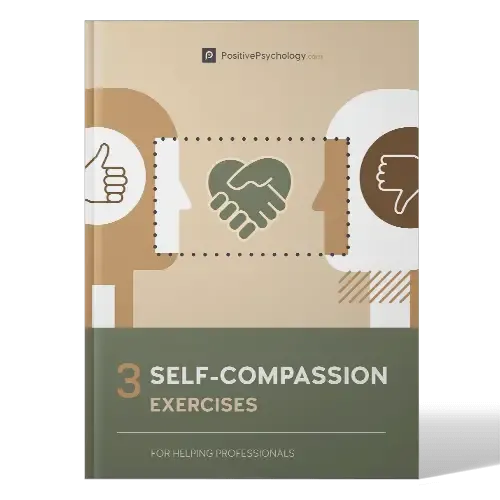What Is Self-Compassion and What Is Self-Love?
 You’ve probably heard about the importance of loving yourself, forgiving yourself, and treating yourself with compassion.
You’ve probably heard about the importance of loving yourself, forgiving yourself, and treating yourself with compassion.
But is it really that vital? Can’t you get along just fine without all that mushy, touchy-feely self-love stuff?
As it turns out, you can get along just fine—but you will likely never thrive!
Read on to learn more about self-compassion, self-love, and the huge impact both of these concepts can have on our lives.
Before you continue, we thought you might like to download our three Self-Compassion Exercises for free. These detailed, science-based exercises will not only help you increase the compassion and kindness you show yourself, but also give you the tools to help your clients, students, or employees show more compassion to themselves.
This Article Contains:
- What Is the Meaning of Self-Compassion and Self-Love? (A Definition)
- Self-Compassion According to Kristin Neff – A Leading Expert
- Self-Compassion and Positive Psychology
- Self-Love & Psychology: Understanding Its Importance
- Self-Love is the Best Love: 7 Quotes and Affirmations
- Examples of Healthy Self-Love and Self-Compassion
- How to Love Yourself: Acceptance Is Key
- Practicing Self-Compassion With Meditation
- A Take-Home Message
- References
What Is the Meaning of Self-Compassion and Self-Love? (A Definition)
Self-compassion and self-love are two related, but distinct, concepts.
Self-compassion is being “kind and understanding when confronted with personal failings” (Neff, n.d.). It means that you act the same way toward yourself when you are going through a tough time that you would act towards a dear friend: noticing the suffering, empathizing or “suffering with” yourself, and offering kindness and understanding.
On the other hand, self-love is “a state of appreciation for oneself that grows from actions that support our physical, psychological, and spiritual growth” (Khoshaba, 2012). It is about valuing yourself as a human being who is worthy of love and respect.
Self-love is a more stable construct than self-compassion; while you can choose to be compassionate towards yourself in any moment, self-love is probably something that you will need to build up.
Self-compassion vs. self-esteem and confidence
If you’re wondering how self-compassion is different from other similar constructs like self-esteem, or self-confidence, wonder no more! Renowned expert and leading self-compassion researcher Dr. Kristin Neff explains how they differ.
“Although self-compassion may seem similar to self-esteem, they are different in many ways. Self-esteem refers to our sense of self-worth, perceived value, or how much we like ourselves… In contrast to self-esteem, self-compassion is not based on self-evaluations. People feel compassion for themselves because all human beings deserve compassion and understanding, not because they possess some particular set of traits.”
Neff, n.d.
Regarding self-confidence, it is missing a key component that self-compassion includes:
“While self-confidence makes you feel better about your abilities, it can also lead you to vastly overestimate those abilities. Self-compassion, on the other hand, encourages you to acknowledge your flaws and limitations, allowing you to look at yourself from a more objective and realistic point of view.”
Wong, 2017
Self-love vs. narcissism
Although we can easily imagine self-love translating into narcissism if taken to the extreme, in reality, they are two vastly different concepts.
Self-love is about loving yourself without needing to make downward social comparisons, taking pride in your performance and your achievements, giving yourself the validation you need and recognizing that it’s okay to feel uncertain and doubt yourself now and then.
Narcissism is the opposite: Narcissists compare themselves to others to feel better, obsess over looking like the real deal instead of becoming it, crave constant validation from others, and see things in black and white (Well, 2017).
Self-love is an honest and authentic appreciation for the self, while narcissism is all about proving that you’re better than everyone else and making sure others see you as you want to be seen. Self-love is self-focused, while narcissism is other-focused.
Self-Compassion According to Kristin Neff – A Leading Expert

The Self-Compassion Scale (SCS) is made up of 26 items rated on a scale from 1 (almost never) to 5 (almost always). Respondents are instructed to rate the items based on how they typically act towards themselves during difficult times.
There are six components to the SCS:
- Self-kindness
a. Example: “When I’m going through a very hard time, I give myself the caring and tenderness I need.” - Self-judgment
a. Example: “I’m intolerant and impatient towards those aspects of my personality I don’t like.” - Common humanity
a. Example: “When I feel inadequate in some way, I try to remind myself that feelings of inadequacy are shared by most people.” - Isolation
a. Example: “When I think about my inadequacies, it tends to make me feel more separate and cut off from the rest of the world.” - Mindfulness
a. Example item: “When I’m feeling down I try to approach my feelings with curiosity and openness.” - Overidentification
a. Example: “When I fail at something important to me I become consumed by feelings of inadequacy.”
To create a score for each subscale, simply add up all the items for self-kindness, common humanity, and mindfulness, but reverse-score the items for the other three subscales before adding them together to create a sub-score (i.e., 1 = 5, 2 = 4, 3 = 3, 4 = 2, 5 = 1). For an overall score, calculate the mean of all items. Higher scores represent higher self-compassion.
Dr. Neff allows free use of her scale to researchers or other interested parties. You can find the scale and the citation of the article in which it was originally developed here.
Self-Compassion Step by Step: The Proven Power of Being Kind to Yourself – Audiobook
Kristin Neff is a brilliant and passionate researcher who has taught us a ton about self-compassion; she’s a great author and self-compassion trainer as well!
Her six-session training on boosting your self-compassion is called Self-Compassion Step by Step: The Proven Power of Being Kind to Yourself, and you can find the audiobook here.
This course will help you build a foundation in self-acceptance, self-love, and self-compassion through guided meditations, experiential practices, and on-the-spot techniques.
Follow the path laid down by this book, and you will open yourself up to a transformative experience and give yourself the opportunity to lead a healthier life full of more love, joy, happiness, and fulfillment than ever before.
For even more from this self-compassion expert, check out these TED Talks from Kristin Neff.
The Space Between Self-Esteem and Self-Compassion by Kristin Neff
The Components of Self-Compassion by Kristin Neff
Mindfulness and Self-Compassion by Kristin Neff
Self-Compassion and Positive Psychology
Research on the topic of self-compassion has discovered that there are three main components to self-compassion:
- Self-kindness
- Common humanity
- Mindfulness (Neff & Dahm, 2015)
Self-kindness
Self-kindness involves refraining from criticizing and castigating yourself for a mistake or a flaw and being understanding and supportive of yourself.
When we’re in pain, we can recognize the harm of self-judgment and treat ourselves warmly and patiently instead (Gilbert & Irons, 2005).
Self-kindness means recognizing our unconditional worth, even when we fall short of our own expectations (Barnard & Curry, 2011).
Common humanity
Our need to connect is part of what makes us human (Maslow, 1943). Having common humanity means recognizing the broader human experience, rather than seeing ourselves as isolated or separate from others (Neff, 2003).
Common humanity also means remembering that we’re not alone when we feel imperfect, hurt, or lonely; rather than withdrawing or isolating ourselves, when we focus on common humanity, we appreciate that others feel just like we do (Gilbert & Irons, 2005).
Mindfulness
Although mindfulness is mentioned in the three components of self-compassion, some researchers feel it should be at the forefront of self-compassion work, rather than one of its components.
Germer (2009) noticed that mindfulness is often the first step toward self-compassion and that mindfulness and self-compassion combined can take the benefits far beyond what simple mindfulness or self-compassion alone can bring.
Self-Love & Psychology – Understanding Its Importance

Self-compassion and depression
Those with low self-compassion are at risk for greater avoidance of their problems, more rumination over their negative thoughts and feelings, and worse functioning (Krieger et al., 2013).
In addition, self-compassion can act as a buffer between us and self-judgment, isolation, and over-identification—common issues in depression. Those with higher self-compassion are not only generally less troubled by these symptoms, but they are also better able to cope with them than those who do not show themselves as much compassion (Kӧrner et al., 2015).
8 Benefits of having self-compassion
It would take an entire article to chronicle all the different ways having self-compassion can benefit you, so instead we’ll list some of the most common and most significant benefits (Firestone, 2016).
- Greater happiness
- Higher optimism
- More positive affect (good mood)
- A greater sense of wisdom
- More motivation and willingness to take initiative
- Increased curiosity, learning, and exploration
- Higher agreeableness
- More conscientiousness
Self-Love is the Best Love: 7 Quotes and Affirmations
Everyone loves a good quote! Refer back to these self-acceptance quotes when you need a quick boost of inspiration to love yourself.
“To fall in love with yourself is the first secret to happiness.”
Robert Morely
“Love yourself unconditionally, just as you love those closest to you despite their faults.”
Les Brown
“To love yourself right now, just as you are, is to give yourself heaven. Don’t wait until you die. If you wait, you die now. If you love, you live now.”
Alan Cohen
“Be gentle with yourself, learn to love yourself, to forgive yourself, for only as we have the right attitude toward ourselves can we have the right attitude toward others.”
Wilfred Peterson
If these quotes don’t give you a jolt of self-love and self-compassion, try adopting one of the following affirmations instead.
- “I approve of myself. I love myself deeply and fully.”
- “I am worthy of love and joy.”
- “My life is a gift. I will use this gift with confidence, joy, and exuberance.”
Read about these and discover more sample affirmations.
5 Examples of Healthy Self-Love and Self-Compassion

How do we go about loving and showing compassion for ourselves?
There are tons of examples all around us, including the following:
- A generally high-achieving student who fails a test but tells herself, “It’s alright, we all fail sometimes. You’re still a pretty good student overall.”
- A father who loses his temper and raises his voice to his child might tell himself, “You’re not a bad father. You just lost your temper. Everyone loses their temper once in a while. I’ll apologize to my child, forgive myself, and commit to doing better in the future.”
- A wife who lets slip something insulting about her mother-in-law to her husband shows self-compassion by thinking, “Everyone makes mistakes. I made a mistake and I feel bad about it, but it doesn’t make me a bad person.”
- A person who forgets about meeting up with a friend and feels terrible about it might show herself love by saying, “I can be forgetful sometimes, but I’m always forgiving when a friend forgets something, so I’m going to be forgiving to myself as well. I am still a good friend and I will plan to make it up to her.”
- An employee who does not receive the promotion he was hoping for would show himself compassion by telling himself, “Getting this promotion does not define you. You are still a great person and a good worker. You just need to put some effort into improving your skills in a few areas. You’ll get it next time!”
These individuals are certainly not narcissists or cold-hearted, unfeeling people; they are simply treating themselves like they would treat a friend in a difficult time.
How to Love Yourself – Acceptance Is Key
The first step to working on your acceptance and self-love is to determine where you are on those fronts. You can use Neff’s (2003) scale above to assess your level of compassion toward yourself, but simply sitting and thinking about how you tend to feel about, think about, and talk to yourself can give you a pretty good idea.
Once you know where you are, you can figure out where you want to go and determine how best to get there. Use these tips to get to your desired level of self-compassion/self-love).
Learn more by reading: How to Practice Self-Compassion: 8 Techniques and Tips.
6 Tips for practicing self-compassion and self-love
Self-love expert Margaret Paul (2014) has outlined six vital steps you can take to enhance your love for yourself.
Paul calls this process “inner bonding” and notes its powerful healing abilities. All you need to do is practice these six steps regularly to gradually enhance your ability to love yourself.
You can find her six tips here.
Practicing Self-Compassion and Meditation
Self-compassion and meditation go hand in hand. One of the best ways to build up your compassion for yourself is to understand yourself better, enhance your awareness of what’s going on in your own head, and cultivate a sense of love and a feeling of goodwill to all—it just so happens that mindfulness meditation does exactly that!
Guided meditations for self-love and compassion
Check out the guided meditations if you’re interested in developing a self-compassion meditation practice.
10-Minute Guided Meditation for Self-Compassion from Live Sonima
Guided Meditation for Confidence, Self-Love, and a Better Self-Image from Joe T at Hypnotic Labs
Self-Love: Guided Meditation on Unconditionally Love You from Positive Magazine Meditation
Guided Meditation for Self-Compassion from Green Mountain at Fox Run
A Take-Home Message
If you’ve stuck with me for this entire piece—thank you! I’m so glad you took this winding journey through the information, resources, and techniques for improving your self-love and self-compassion with me.
I hope you found the journey helpful and learned at least a few new things. If you did, I’d love to hear what helped. If you didn’t, I’d love to hear about that too! Leave us a comment about your experience practicing self-love and boosting your self-compassion.
Thanks for reading!
We hope you enjoyed reading this article. Don’t forget to download our three Self Compassion Exercises for free.
- Barnard, L. K., & Curry, J. F. (2011). Self-compassion: Conceptualizations, correlates, & interventions. Review of General Psychology, 15(4), 289-303.
- Firestone, L. (2016). The many benefits of self-compassion. Psychology Today. Retrieved from https://www.psychologytoday.com/us/blog/compassion-matters/201610/the-many-benefits-self-compassion
- Germer, C. (2009). The mindful path to self-compassion: Freeing yourself from destructive thoughts and emotions. Guilford Press.
- Gilbert, P., & Procter, S. (2006). Compassionate mind training for people with high shame and self-criticism: Overview and pilot study of a group therapy approach. Clinical Psychology and Psychotherapy, 13, 353-379.
- Khoshaba, D. (2012). A seven-step prescription for self-love. Psychology Today. Retrieved from https://www.psychologytoday.com/us/blog/get-hardy/201203/seven-step-prescription-self-love
- Kӧrner, A., Coroiu, A., Copeland, L., Gomez-Garibello, C., Albani, C., Zenger, M., & Brӓhler, E. (2015). The role of self-compassion in buffering symptoms of depression in the general population. PLoS One, 10.
- Krieger, T., Altenstein, D., Baettig, I., Doerig, N., & Holtforth, M. G. (2013). Self-compassion in depression: Associations with depressive symptoms, rumination, and avoidance in depressed outpatients. Behavior Therapy, 44, 501-513.
- Maslow, A. H. (1943). A theory of human motivation. Psychological Review, 50(4), 370.
- Neff, K. (n.d.). Definition of self-compassion. Self-Compassion.org. Retrieved from http://self-compassion.org/the-three-elements-of-self-compassion-2/
- Neff, K. D. (2003). Development and validation of a scale to measure self-compassion. Self and Identity, 2, 223-250.
- Neff, K., & Dahm, K. A. (2015). Self-compassion: What it is, what it does, and how it relates to mindfulness. In B. D. Ostafin (Ed.), Handbook of mindfulness and self-regulation (pp. 121-137). Springer.
- Paul, M. (2014, September 18). How do you actually learn to love yourself? Mind Body Green. Retrieved from https://www.mindbodygreen.com/0-15295/how-do-you-actually-learn-to-love-yourself.html.
- Well, T. (2017). Is self-love healthy or narcissistic? Psychology Today. Retrieved from https://www.psychologytoday.com/us/blog/the-clarity/201702/is-self-love-healthy-or-narcissistic
- Wong, K. (2017). Why self-compassion beats self-confidence. The New York Times. Retrieved from https://www.nytimes.com/2017/12/28/smarter-living/why-self-compassion-beats-self-confidence.html
Let us know your thoughts
Read other articles by their category
- Body & Brain (42)
- Coaching & Application (56)
- Compassion (26)
- Counseling (50)
- Emotional Intelligence (24)
- Gratitude (17)
- Grief & Bereavement (21)
- Happiness & SWB (39)
- Meaning & Values (25)
- Meditation (20)
- Mindfulness (44)
- Motivation & Goals (43)
- Optimism & Mindset (32)
- Positive CBT (25)
- Positive Communication (20)
- Positive Education (44)
- Positive Emotions (30)
- Positive Leadership (13)
- Positive Psychology (32)
- Positive Workplace (33)
- Productivity (16)
- Relationships (42)
- Resilience & Coping (34)
- Self Awareness (20)
- Self Esteem (36)
- Software & Apps (22)
- Strengths & Virtues (30)
- Stress & Burnout Prevention (33)
- Theory & Books (44)
- Therapy Exercises (35)
- Types of Therapy (58)





What our readers think
Love the work and appreciate the time and effort you put into this. Thank you!
hello i wanted a clarity, compassion itself is an action word, it means to feel for the other and willing to do something to relieve the sufferings.
In such a definition, self- compassion should mean, not just acknowledging with my own negative feelings but also doing something in order to relieve myself from it and move towards higher energy state. Actions are in the form of self-love just because there is a word, otherwise self-compassion itself give the entire meaning.
Would you agree?
Hi Tena,
I would suggest that self-compassion may not always require that you take action. For instance, I might find myself feeling lethargic and unmotivated to act in any way at all. This might be due to any number of circumstances — I could be grieving, suffering from physical pain, or experiencing depression. If I’m to view myself with self-compassion, I would view myself with kindness and understanding, regardless of whether I ultimately took action, rather than beating myself, calling myself ‘bad’ for not doing all the things I should do, etc. That is, I would still know that I am worthy and deserving of love and kindness regardless by virtue of just ‘being’ rather than as a result of anything I am ‘doing’.
And yes, self-love is about the specific actions that we take to show ourselves kindness. So, I’d say self-compassion can exist before or in the absence of action.
Hopefully this is makes sense!
– Nicole | Community Manager
Wow this article is going to change my life. It was so informative with information for ALL different learners. It was not your typical article filled of words, words and more words. I love that there are great handouts, worksheets, tips, references quotes and much more.
Very much informative information thank you
Thank you , this was an amazing article , thank you for taking your time to write this !
Thank you very Nice website article
Thank you for this information. ??
I found this article to be very informative, and easy to understand.
Wonderful insight!! Thanx!!
I did a search for “self compassion” and found your excellent article. Thank you. I am struggling. I am an adult child of emotionally immature parents. Father narcissist (physician). Mother controlling. I’ve recently turned 80 and retired from doing psychotherapy (MFT) and am working on a book. I’ve done two already. “Requiem for a Dying World.” I am dealing with depression. Sadness. Grief. My poor Little Johnny needs compassion and hopefully as I digest your article I can learn to give it to him.
Hello sir, how are you doing now? I hope you are much better, wish you the best.